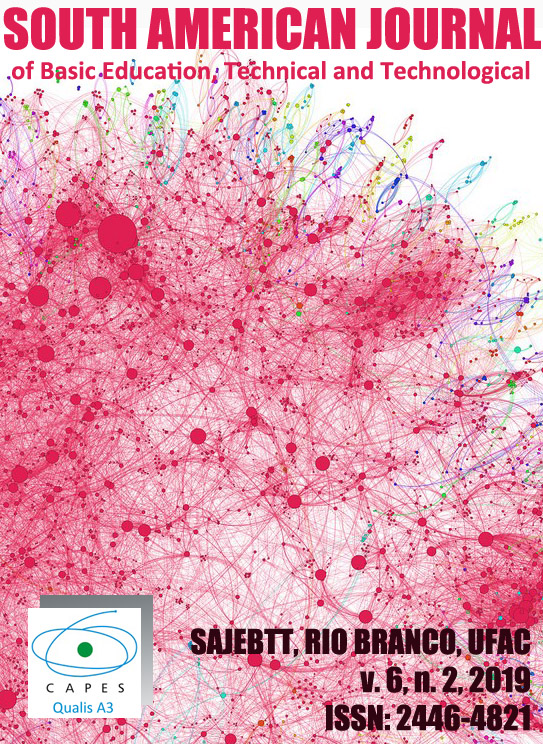Soil contamination in urban squares and beaches by larvae of Strongyloides spp. and Hookworm in a tourist town in northeastern Brazil
Resumen
Helminth parasites are widely distributed in nature, they are known as humans and animals parasites. The hookworms and gender Strongyloides spp. cause skin, pulmonary and intestinal disease. In common, these helminths have infective forms present in the soil. In this sense, this study had as objective to evaluate the contamination of beaches and squares of Natal / RN (regions of great circulation of people and animals) by larvae of hookworms and Strongyloides spp. during the period between July 21, 2015, and February 1, 2016. The larvae were searched in regions of different humidity and luminosity. The soil samples were submitted to the Baermann-Moraes method to search for the larvae, which were then morphologically differentiated by light microscopy. The prevalence of human parasites in the six beaches was 16.7% while in 118 urban squares was 11.76%, in both sites the hookworms were more common. The parasites were found preferentially in hot and rainy periods. This is the first survey of the type carried out in the State and in an unprecedented way concludes that in Natal/RN there are squares and beaches contaminated by parasites that may represent a risk to human health, so are be necessary public health measures that act mainly on the adequate removal of sewage, trash and stray animals.Citas
Araújo, F.R; Crocci, A.J; Rodrigues, R.G.C; et al. Contaminação de praças públicas de Campo Grande, Mato Grosso do Sul, Brasil, por ovos de Toxocara e Ancylostoma em fezes de cães. Rev Soc Bras Med Trop, v. 32, p. 581-583, 1999.
Knopp, S; Mohammed, K.A; Khamis, I.S; et al. Spatial distribution of soil-transmitted helminths, including Strongyloides stercoralis, among children in Zanzibar. Geospat Health, v. 3, p. 47-56, 2008.
Reichert, F; Pilger, D; Schuster, A; et al. Prevalence and Risk Factors of Hookworm-Related Cutaneous Larva Migrans (HrCLM) in a Resource-Poor Community in Manaus, Brazil. PLOS Negl Trop Dis, v. 10, p. e0004514, 2016.
Keiser, P.B; Nutman, T.B. Strongyloides stercoralis in the immunocompromised population. Clin Microbiol Ver, v. 17, n. 1, p. 208-217, 2004.
Ezeamama, A.E; McGarvey, S.T; Acosta, L.P; et al. The synergistic effect of concomitant schistosomiasis, hookworm, and Trichuris infections on children’s anemia burden. PLoS Negl Trop Dis, v. 2, n. 6, p. e245, 2008
Hotez, P. Hookworm and poverty. Ann N Y Acad Sci, v. 1136, n. 1, p. 38-44, 2008.
Del, P.G; Hakimi, S; Vandenbos, F; et al. Autochthonous Cutaneous Larva Migrans in France and Europe. Acta Derm Venereol. 2019.
Bowman, D.D; Montgomery, S.P; Zajac, A.M; et al. Hookworms of dogs and cats as agents of cutaneous larva migrans. Trends Parasitol, v. 26, n. 4, p. 162-167, 2010.
Winnicki, W; Eder, M; Mazal, P; et al. Prevalence of Strongyloides stercoralis infection and hyperinfection syndrome among renal allograft recipients in Central Europe. Sci Rep, v. 8, n. 1, p. 15406, 2018.
Schär, F; Trostdorf, U; Giardina, F; et al. Strongyloides stercoralis: global distribution and risk factors. PLoS Negl Trop dis, v. 7, n. 7, p. e2288, 2013.
Matesco, V.C; Mentz, M.B; Rott, M.B; et al. Contaminação sazonal por ovos de helmintos na praia de Ipanema, em Porto Alegre, Rio Grande do Sul, Brasil. Rev Patol Trop, v. 35, n. 2, p. 135-142, 2006.
Silva, F.S; Paulo, A.D.D.C; Braga, C.D.M.M; et al. Frequência de parasitos intestinais no município de Chapadinha, Maranhão, Brasil. Rev Patol Trop, v. 39, n. 1, p. 63-68, 2010.
Mamus, C.N.C; Moitinho, A.C; Grube, C.C; et al. Enteroparasitoses em um centro de educação infantil do município de Iretama/PR. SaBios. v. 3, n. 2, 2008
Heukelbach, J; Feldmeier, H. Epidemiological and clinical characteristics of hookworm-related cutaneous larva migrans. Lancet Infect Dis, v. 8, n. 5, p. 302-309, 2008.
Oliveira, C.B; Silva, A.S; Monteiro, S.G. Ocorrência de parasitas em solos de praças infantis nas creches municipais de Santa Maria - RS, Brasil. Rev FZVA, v. 14, n. 1, 2007.
Ferreira, I.S; Junior, M.N; Moraes, M.S; et al. Frequência de Geo-Helmintos em áreas recreativas da cidade de Rio Branco, estado do Acre, Brasil. South American Journal EBTT, v. 5, n. 1, 2018.
Mota, K. C. P; Grama, D. F; Fava, N. M. N; et al. Distribution and risk factors of Ascarididae and other geohelminths in the soil of Uberlandia, Minas Gerais, Brazil. Rev Inst Med Trop SP, v. 60, 2018.
Sousa, J.O.D; Santos, E.O.D; Lira, E.M; et al. Análise parasitológica da areia das praias urbanas de João Pessoa/PB. Rev Bras Ciênc Saúde, v. 18, n. 3, p. 195-202, 2014.
Neto, J.J.G; Farias, J.A.C; Matos-Rocha, T.J; Sand contamination by parasites of human importance detected on the beaches of the coastline of Maceió-AL. Arq Med Hosp Fac Cienc Med Santa Casa São Paulo. v. 62, n. 2, p. 81-84, 2017.
Corti, M. Strongyloides stercoralis in immunosuppressed patients. Arch Clin Infect Dis, v. 11, n. 1, 2016.
Coelho, W.A.C; Sakamoto, S.M; Suassuna, A.C.D; et al. Larvas de ancilostomídeos em diferentes ambientes do Estado do Rio Grande do Norte. Rev Caatinga, v. 20, n. 3, p. 207-209, 2007.
Pessoa SB, Martins AV. Parasitologia Veterinária, 11. ed., Rio de Janeiro: Guanabara, 1988.
Heukelbach, J; Wilcke, T; Meier, A; et al. Longitudinal study on cutaneous larva migrans in an impoverished Brazilian township. Travel Med Infect Dis, v. 1, n. 4, p. 213-218, 2003.
Heukelbach, J; Jackson, A; Ariza, L; et al. Prevalence and risk factors of hookworm-related cutaneous larva migrans in a rural community in Brazil. Ann Trop Med Parasitol, v. 102, n. 1, p. 53-61, 2008.
Cassenote, A.J.F; Pinto Neto, J.M; Lima-Catelani, A; et al. Contaminação do solo por ovos de geo-helmintos com potencial zoonótico na municipalidade de Fernandópolis, Estado de São Paulo, entre 2007 e 2008. Rev Soc Bras Med Trop, v. 44, n. 3, p. 371-374, 2011.










